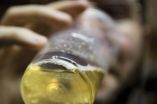(Press-News.org) PISCATAWAY, NJ – Problem drinkers in the general population may reduce the amount of alcohol they consume over a period of years but not to the level of the average adult, according to a new study in the November issue of the Journal of Studies on Alcohol and Drugs.
Given that heavy drinkers often don't become "normal" drinkers on their own, the takeaway message for clinicians and family members is to help connect a problem drinker to a community social service agency or Alcoholics Anonymous. Simply telling someone that they had a drinking problem did not seem to be helpful in this study, but being specific about how to get help did.
Using a telephone screening program, researchers identified 672 problem and dependent drinkers who had not been in an alcohol treatment program for at least 12 months. Eleven years later, men in the study had reduced their average number of drinks per month by 51%, and women had reduced their average number of drinks by 57%. However, even after this reduction, male and female problem drinkers still consumed 160% and 223% more alcohol, respectively, than the average adult without a drinking problem.
The researchers point out that the greatest reductions in alcohol consumption occurred within one to two years after the initial screening and then slowed, suggesting that problem drinkers and heavy drinkers may never lower their consumption to the level of the general population.
"Most heavy drinkers maintain a steady level of heavy alcohol consumption over time," said lead researcher Kevin L. Delucchi, Ph.D., Professor of Biostatistics in Psychiatry at the University of California San Francisco. "It's pretty toxic, but somehow they manage to keep drinking at a fairly sustained level. Our people were functional, for the most part. They had addresses, a lot of them had insurance at baseline, and they're not at the 'bottom of the barrel,' which is interesting."
The researchers say their study is one of the first to examine heavy alcohol use in the general population. Most studies have focused on the most severe drinkers -- those who were already in a treatment program, said Delucchi.
"Not everyone who has an alcohol problem is in treatment or is in a program," said Delucchi. "People are out there on their own."
The researchers also examined which factors appeared to be linked with continued heavy drinking. Participants who received help from Alcoholics Anonymous or community social service agencies were likely to drink less. However, those who had heavy-drinking friends in their social network, received general suggestions that they do something about their drinking, and went to a formal treatment program were actually likely to drink more. Delucchi said they were unable to determine why formal treatment appeared to be linked with continued elevated drinking, although the researchers theorize that perhaps those who sought this type of treatment were likely to have experienced the greatest level of alcohol-related problems and, therefore, were more likely to have sought such treatment.
###
Delucchi, K. L., & Kaskutas, L. A. (November 2010). Following Problem Drinkers Over Eleven Years: Understanding Changes in Alcohol Consumption. Journal of Studies on Alcohol and Drugs, 71 (6), 831-836.
Available at: www.jsad.com/jsad/link/71/831
END
Richmond, Va. (Oct. 27, 2010) – If you were dying from cancer, would you consider genetic testing? A recent study conducted by researchers from Virginia Commonwealth University Massey Cancer Center showed that most terminally ill cancer patients who were eligible for genetic testing never received it despite that it could potentially save a relative's life.
The research, "Exploring Hereditary Cancer Among Dying Cancer Patients—A Cross-Sectional Study of Hereditary Risk and Perceived Awareness of DNA Testing and Banking," was recently published in the Journal of Genetic ...
The new version of the Addiction Severity Index (ASI) gives health professionals the opportunity to design an integral and personalised plan of assistance for patients suffering disorders due to substance abuse.
Developed by the University of Pennsylvania (USA) in the 1980s, the ASI is the most used tool for studying disorders due to substance abuse. After more than 25 years of use, current trends have led ASI creators to update their index and adapt it to the present day reality. The new ASI-6 includes significant structure and content changes in regard to the previous ...
Scientists have discovered the secret of how an amazing sea snail injects its venom after shooting a harpoon-like tooth into its prey — or some unlucky swimmer — at jetliner speeds. The creatures, called cone snails, use a highly specialized structure that instantly pumps the paralyzing venom through the tooth and into its target. Their study appears in ACS' monthly Journal of Proteome Research.
Helena Safavi-Hemami, Anthony Purcell and colleagues note that cone snails live mainly in the shallows of the world's tropical oceans. Prized by sea-shell collectors for their ...
Tobacco, used on a small scale as a natural organic pesticide for hundreds of years, is getting new scientific attention as a potential mass-produced alternative to traditional commercial pesticides. That's the topic of a report in ACS' bi-weekly journal Industrial & Engineering Chemistry Research.
Cedric Briens and colleagues note that concerns about the health risks of tobacco have reduced demand and hurt tobacco farmers in some parts of the world. Scientists are looking for new uses for tobacco. One potential use is as a natural pesticide, due to tobacco's content ...
Scientists are reporting development of a new approach for dealing with offensive household and other odors — one that doesn't simply mask odors like today's room fresheners, but eliminates them at the source. Their research found that a deodorant made from nanoparticles — hundreds of times smaller than peach fuzz — eliminates odors up to twice as effectively as today's gold standard. A report on these next-generation odor-fighters appears in ACS' Langmuir, a bi-weekly journal.
Brij Moudgil and colleagues note that consumers use a wide range of materials to battle undesirable ...
Move over, touchpad screens: New research funded in part by the National Institutes of Health shows that it is possible to manipulate complex visual images on a computer screen using only the mind.
The study, published in Nature, found that when research subjects had their brains connected to a computer displaying two merged images, they could force the computer to display one of the images and discard the other. The signals transmitted from each subject's brain to the computer were derived from just a handful of brain cells.
"The subjects were able to use their thoughts ...
Why do some of the one million people who sustain head injuries annually in United States experience a mysterious second wave of brain damage days after the initial injury — just when they appear to be recovering? Limited clinical trials using an innovative new device to monitor brain chemistry on a second-by-second basis are underway to answer that life-and-death question, according to an article in the current issue of Chemical & Engineering News (C&EN), ACS' weekly newsmagazine. Brain injury is the leading cause of death and disability worldwide.
C&EN Senior Editor ...
Scientists are calling for more research on the possibility that some supposedly healthful plant-based antioxidants — including those renowned for their apparent ability to prevent cancer — may actually aggravate or even cause cancer in some individuals. Their recommendation follows a study in which two such antioxidants — quercetin and ferulic acid — appeared to aggravate kidney cancer in severely diabetic laboratory rats. The study appears in ACS' bi-weekly Journal of Agricultural and Food Chemistry.
Kuan-Chou Chen, Robert Peng, and colleagues note that vegetables, ...
Extending its 26-year tradition of innovative quantum voltage standards, researchers at the National Institute of Standards and Technology (NIST) have begun shipping a new 10-volt standard to users around the world. The programmable system measures both direct current (DC) and alternating current (AC) voltages.
NIST AC/DC 10-volt standard chip.
The new 10-volt system* builds on a number of previous NIST inventions, from the initial 1-volt standard in 1984 through the 2006 unveiling of the world's first precision instrument for directly measuring AC voltages.** Because ...
Better psychological and spiritual support, improved planning of care and stronger relationships with physicians are necessary to improve end-of-life care in Canada, according to a study by a Queen's University professor.
"High quality end-of-life care should be the right of every Canadian," says professor of Medicine and Epidemiology Daren Heyland, who is also a researcher at Kingston General Hospital. "But it's not always happening. We know from international studies that Canada ranks ninth in the world in terms of quality of care provided at the end of life."
The study, ...

